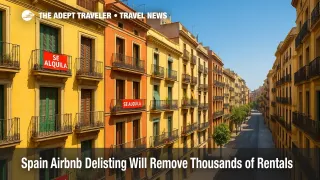Spain Airbnb Delisting Will Remove Thousands of Rentals

Spain will strike more than 100,000 short-term listings from platforms such as Airbnb and Booking.com in the coming weeks, pressing ahead with the country's most aggressive housing reform in decades. The consumer rights ministry confirmed that 65,000 adverts already removed in May were only the first wave, with another 54,728 unregistered tourist apartments now queued for deletion. Officials say the Spain Airbnb delisting drive is central to easing the chronic housing shortage that has fueled anti-tourism protests.
Key Points
- Why it matters: Spain plans to purge up to 120,000 unlicensed tourist flats nationwide
- Travel impact: Short-term rental supply could drop 14 percent, pushing prices and hotel demand higher
- What's next: Platforms have 10 days to verify codes; fines up to €600,000 await non-compliant hosts
Snapshot
Spain's crackdown rests on Royal Decree 1312/2024, which created a single national registry for tourist accommodation and became compulsory on July 1. Hosts must now display a Número de Registro de Alquiler (NRA) as well as any regional permit, and platforms must verify each listing. Non-compliant adverts will be removed in batches without compensation. Consumer Rights Minister Pablo Bustinduy argues that the measure defends the constitutional right to housing. Airbnb has appealed, claiming many flagged properties are lawful, yet the company separately agreed on July 17 to provide monthly compliance reports and to pull infringing listings within ten days of notification. Booking.com and other sites face identical obligations. Full text of the decree is available via the Boletín Oficial del Estado (https://www.boe.es/diario_boe/txt.php?id=BOE-A-2024-26931?utm_source=adept.travel).
Background
Spain welcomed 85 million international visitors in 2024, second only to France, but the tourism rebound has deepened tensions over housing. Rents in Madrid and Barcelona have risen more than 11 percent year on year, according to Idealista. Activists cite short-term tourist apartments as a key driver, prompting cities from Málaga to the Balearics to cap licences and raise visitor taxes. The national government first targeted platforms in December 2024, when the consumer ministry opened an investigation into Airbnb. In May 2025 it ordered the removal of 65,000 listings that lacked permit numbers or ownership details. Royal Decree 1312/2024, adopted in December but phased in over six months, aligns with EU Regulation 2024/1028 and allows fines of up to €300,000 per repeat violation.
Latest Developments
Registry Deadline Triggers Massive Purge
With the July 1 registry deadline now passed, the ministry has begun sharing its database with major booking sites. Officials confirmed on August 5 that they will formally instruct platforms to delist the 54,728 newly identified properties over the next fortnight, alongside any other adverts missing an NRA code. Affected hosts will receive ten working days to prove compliance before removal; those whose licences have been revoked will be taken offline within 48 hours. The ministry is also monitoring compliance by Booking.com, Vrbo, and Spain-based Holidu. Failure to act could result in fines of up to €600,000 per infringement, although no penalties have yet been imposed. Regional inspectors in Andalusia and Catalonia now have real-time access to the registry to speed enforcement.
Analysis
For travelers, the immediate effect of the Spain Airbnb delisting is a shrinking inventory during peak season. Data from analytics firm AirDNA indicate that Madrid alone has already lost 14 percent of its active short-term supply since May. Industry groups warn that the purge could push nightly rates higher or divert visitors to traditional hotels, many of which are nearing full occupancy in Barcelona for August. Residents, however, have welcomed the move; a Canary Islands protest in April drew more than 50,000 participants demanding stricter curbs on overtourism.
Platforms face a complex compliance burden. Spain now operates Europe's strictest single-registration system, surpassing the lighter self-reporting models in France and Portugal. Airbnb's decision to strike a deal with Madrid shows a desire to avoid prolonged litigation that could erode its market share, yet the company's appeal argues that the ministry has exceeded its competence and that many delisted homes cater to mid-term stays. Legal scholars note that if the court backs Airbnb, the government may need to refine its evidence standards, potentially slowing enforcement.
Investors in Spain's booming coastal buy-to-let sector are also on edge. The Spanish Federation of Tourist Housing estimates the law could remove up to 70 percent of current listings, costing the economy €13.7 billion in lost visitor spending during the second half of 2025. Conversely, real-estate analysts expect the supply shock to cool residential rent inflation in central districts-a political win ahead of regional elections. Travelers should therefore expect higher prices, stricter ID checks, and fewer "instant book" options as the market adjusts.
Final Thoughts
Spain's decision marks a turning point in Europe's struggle to balance tourism with livability. By shifting the burden from municipal inspectors to booking platforms, Madrid is betting that large-scale data sharing will prove more efficient than street-level raids. Travelers should verify that their chosen apartment carries both an NRA and regional code and keep flexible back-up options in case a property is suddenly removed. Hosts who fail to regularize risk heavy fines and a permanent ban. Whether the reforms temper rent inflation or simply displace demand to neighboring countries will become clear in 2026, but the policy has already redrawn the map for vacation stays in Spain Airbnb delisting
Sources
- Spain targets 120,000 Airbnb listings deemed illegal, Reuters
- Spain blocks more than 65,000 Airbnb holiday rental listings, Reuters
- Airbnb reaches agreement with Spanish government to remove irregular listings, Spain in English
- Real Decreto 1312/2024 text, BOE
- Nuevo registro obligatorio de arrendamientos de corta duración, Cinco Días
